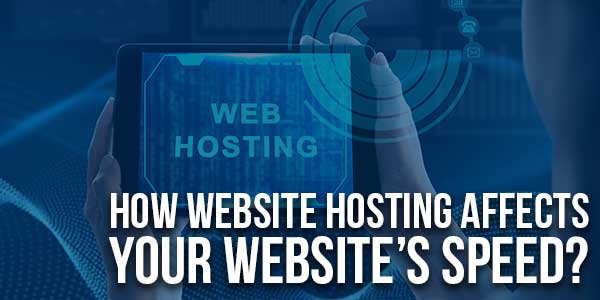
In today’s fast-paced digital world, every second counts. So if you’ve got a website, optimizing your page loading speed is pretty important. You’ve probably already done all the little things to give your site speed a boost… But there’s something most website owners overlook when it comes to loading speed.
Did you know that your chosen website hosting affects your website’s speed? If you’ve ticked, all the other boxes and your website speed is still not where you want it to be… Then your web host may be the problem.
Here’s how website hosting affects your website’s speed and your users’ satisfaction… And why you should be extra careful when choosing a web host!
Table of Contents
Understanding The Connection Between Hosting And Speed:
It’s time to demystify the connection between website hosting and speed. Two crucial factors come into play here: bandwidth and server response time.
Bandwidth: The Speed Highway
Imagine bandwidth as a highway, connecting your website to its visitors. If your site has low bandwidth, it’ll quickly slow down when experiencing high traffic. Imagine a highway with a speed limit of 25 mph… It would quickly become bumper-to-bumper traffic crawling down the road!
On the other hand, high bandwidth is like a free, clear road with a 75 mph limit. As long as everyone behaves, things flow… Just like your website.
When choosing a web host, prioritize ones that offer a good amount of bandwidth, but don’t just rely on what they claim! Real user reviews will give you a more accurate picture, so do your research first.
Server Response Time: The Accelerator Pedal
Sticking to the motor-themed analogies, you can envision the server response time as the accelerator of your website. When the server is fast, your website loads fast. When your server is slow, your “acceleration” is slow, leading to slow loading times.
On the other hand, your visitors’ accelerators are very fast when it comes to leaving a page that’s loading slowly! More than half of them will jump ship if your page isn’t loaded within 3 seconds, so opting for a hosting provider with fast servers is essential for maintaining optimal speed.
Why Website Speed Matters?
Now that we’ve explored how hosting affects website speed let’s get into why speed matters and how it impacts your online presence.
Enhanced User Experience:
In today’s fast-paced society, users demand instant gratification. Slow-loading websites are the exact opposite, which means they frustrate visitors… Who then leaves to look for faster alternatives. A seamless and responsive user experience keeps your visitors engaged and encourages them to explore your content.
Visitor Retention:
Slow websites don’t just repel visitors. They also discourage them from returning. Studies show that most people won’t come back to your site if they encounter slow load times, so prioritizing website speed is vital for gaining repeat traffic.
Conversions And Sales:
A slow website lowers your chances of converting visitors into customers. Slow-loading sites experience lower conversion rates, while speedier websites encourage users to take action, whether it’s making a purchase, subscribing to a newsletter, or engaging with your content.
Brand Image And Reputation:
Your website is a reflection of your brand’s professionalism. A slow, poorly designed site can leave a negative impression on visitors. A fast, well-optimized site enhances your brand’s reputation and positions you as an industry leader.
SEO Rankings:
Website loading speed is a crucial factor that’s considered by search engines like Google when ranking websites. A faster loading has the potential to improve your search engine rankings, driving more organic traffic to your website.

Ways That Website Hosting Can Affect Your Website’s Speed:
So, let’s dive into how exactly web hosting affects your site’s speed so you understand exactly why this is such an important choice.
Server Location:
If your web host’s servers are located in a different country than your target audience, the data needed for your site to be visible to them will have to travel farther to reach them. This can slow down your website’s load time quite a bit.
Server Hardware:
Older servers with slower processors and less RAM will be slower than newer servers with faster processors and more RAM. Check what your host is using before choosing one… Or compare your current host to others to see if they’re decent or not.
Server Software:
Older versions of software may not be as optimized or as effective as newer versions. Ensure that your chosen web host is up to date with their own software. If they’re still using old versions, move on.
Server Load:
If the server is overloaded with other websites, your website may slow down. This is an unfortunate result of being on shared website hosting, so you may want to consider choosing dedicated or VPS hosting instead.
Tips For Choosing A Web Hosting Provider:
Whether you’re launching a new site or you’re looking to change your current web hosting provider, here’s what you should be considering.
Uptime Scores:
The gold standard for uptime is 99.9%. Don’t settle for less! You may be shocked at what a difference in downtime there is between 99% and 99.9%, so only consider web hosts who guarantee this number. But also, don’t take their word for it—read as many real reviews as you can.
Allocated Server Resources:
Make sure the allocated resources meet your needs. On shared hosting plans, you’ll have to share resources with other sites, which is not optimal. VPS hosting has a finite number of resources, which might not be enough. Double-check this before choosing a host.
Security Measures:
Prioritize web hosts that offer robust security features like SSL certificates and secure access. This is non-negotiable—if your website is breached and users’ private details are leaked, your credibility will be forever destroyed. On the other hand, you really don’t want a hacker ruining your site, holding it for ransom, or gaining access to any information.
Server Location:
Consider your target audience’s geographic location and choose a hosting provider with servers located near your primary audience for optimized loading speeds. If your audience is worldwide, you might want to consider using a CDN to prevent problems.
Content Delivery Network (CDN):
CDN services can significantly improve loading times. They cache your website’s content on multiple servers located worldwide, reducing the distance information needs to travel. Check if your web host offers a CDN.
Scalability:
Select a web host that can accommodate your website’s growth with scalable hosting plans. This will help your site maintain optimal speed as your business expands.
Backup And Support:
Choose a web host that provides regular backups of your site and offers reliable customer support to address any technical issues promptly. You need to know that they’re in your corner if something goes wrong.
Intuitive Content Management System:
Look for a web host with a user-friendly content management system (CMS) or website builder that minimizes unnecessary code and streamlines content creation and management.
FTP/SFTP Access:
Seamless file transfer capabilities allow for quick downloads from your site, ensuring a smooth user experience for those accessing your digital files.
Conclusion:
Now that you’re armed with the knowledge of how website hosting affects your website’s speed, it’s time to take action. Select a hosting provider that aligns with your website’s requirements to make sure your site maintains optimal speed, user experience, and conversions.
Remember, your web hosting choice is the foundation on which your site’s performance is built. So, choose wisely, and let your website soar to new heights of speed and success!

 About the Author:
About the Author:















Be the first to write a comment.